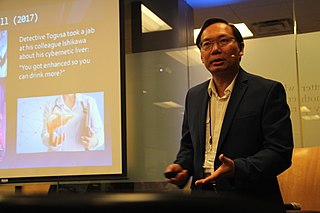A Quote by Robert Lanza
In fact when you combine stem cell technology with the technology known as tissue engineering you can actually grow up entire organs, so as you suggest that sometime in the future you get in an auto accident and lose your kidney, we'd simply take a few skin cells and grow you up a new kidney. In fact this has already been done.
Related Quotes
The brain is a tissue. It is a complicated, intricately woven tissue, like nothing else we know of in the universe, but it is composed of cells, as any tissue is. They are, to be sure, highly specialized cells, but they function according to the laws that govern any other cells. Their electrical and chemical signals can be detected, recorded and interpreted and their chemicals can be identified; the connections that constitute the brain's woven feltwork can be mapped. In short, the brain can be studied, just as the kidney can.
In science there is something known as a stem cell. A stem cell is an undifferentiated cell which has not yet decided whether it's gonna be a cell of your brain or a cell of your heart or of your finger nail. But science is learning how to coax, how to manipulate, the raw material of life that we call stem cell to become any cell of the body. I think that God is the stem cell of the universe.
...and suddenly it hits you: Human skin is actually made up of billions of tiny units of protoplasm, called "cells"! And what is even more interesting, the ones on the outside are all dying! This is a fact. Your skin is like an aggressive modern corporation, where the older veteran cells, who have finally worked their way to the top and obtained offices with nice views,are constantly being shoved out the window head first, without so much as a pension plan,by younger hotshot cells moving up from below.
The average person doesn't understand what a stem cell is. There's a lack of health literacy in our nation. So the public can't really get into this dialogue because they don't understand the complexity of stem cells, not the faith-based approach, not the ideological or political, but the science behind stem cells.
Once I started to get aligned with the God in me, something hit me hard: I learned that our worth, our validation, our purpose and our acceptance don't stem from what we should do. They don't stem from what we have. They don't stem from what we've done or who we were. They stem simply from the fact that we are.
Both in Britain and America, huge publicity has been given to stem cells, particularly embryonic stem cells, and the potential they offer. Of course, the study of stem cells is one of the most exciting areas in biology, but I think it is unlikely that embryonic stem cells are likely to be useful in healthcare for a long time.





































